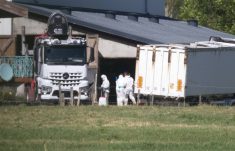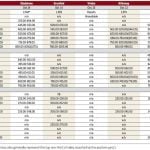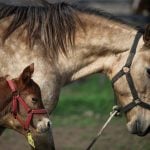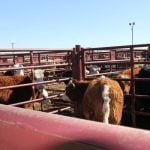Canada’s first chance to prosecute a breach of its laws against traffic in dangerous pathogens has ended in a guilty plea from a previously well-regarded researcher over stray vials of brucellosis-causing bacteria.
Dr. Klaus Nielsen, who had worked at the Canadian Food Inspection Agency’s Fallowfield lab southwest of Ottawa, was first arrested in October 2012 on allegations of breach of trust by a public officer, followed in April last year with charges under the federal Export and Import Permits Act, Transportation of Dangerous Goods Act and Human Pathogens and Toxins Act.
Read Also

U.S. livestock: Cattle fall sharply as Trump says he’s working to lower beef costs
Chicago cattle futures fell sharply on Friday after U.S. President Donald Trump said his administration was working to lower the…
A Richmond, Ont. resident once lauded for his work on a quicker and cheaper brucellosis test for cattle, Nielsen was charged following what RCMP said was a short-lived trip in which he carried vials of live Brucella bacteria in an “unsafe manner.”
Nielsen, 68, pled guilty Wednesday in Ontario’s Superior Court in Ottawa on the breach-of-trust charge. He next appears Oct. 14 to schedule a date for a sentencing hearing, a spokesperson for the federal Public Prosecution Service said Wednesday.
The service previously noted Nielsen’s case marks Canada’s first-ever prosecution under the Human Pathogens and Toxins Act.
Charges against Nielsen and another CFIA researcher, Wei Ling Yu of Ottawa, stemmed from a criminal investigation dubbed “Project Sentimental,” run by RCMP working with the Public Health Agency of Canada (PHAC) and federal department of foreign affairs and international trade, the Mounties said.
CFIA had first reported the matter in March 2011, RCMP said, adding the investigation focused on Nielsen and Yu’s alleged “unlawful efforts to commercialize intellectual property belonging to the CFIA and a private commercial partner.”
The actions leading to the breach-of-trust charges were believed to date back to 2005, the RCMP said last April.
“Unsafe manner”
Backed up by “clandestine laboratory” response teams, hazmat response teams and Ottawa first responders, RCMP “intercepted” Nielsen on Oct. 24, 2012, when he was believed to be on his way to Ottawa’s airport bound for China.
RCMP in April 2013 said they found 17 vials of pathogens Nielsen was “attempting to export in an unsafe manner.” Media reports on Wednesday quoted court documents as saying the vials were packed in ice and bubble wrap in a children’s lunch bag in Nielsen’s luggage.
PHAC later analyzed the vials and found them to contain live Brucella bacteria, which it’s believed were intended to be used in the unauthorized commercial development of brucellosis test kits, RCMP said.
A warrant has since been out for Yu’s arrest but she’s believed to be in China.
Nielsen had been hailed in the early 2000s for his work with the team developing the fluorescence polarization assay (FPA) — a relatively inexpensive 15-second test to catch brucellosis in cattle.
The FPA was later approved as an official test for brucellosis in Canada, and by the World Organization for Animal Health (OIE) as a prescribed test for the bovine, porcine and caprine/ovine forms of the disease.
Abortions, infertility
Brucellosis, caused by several species of Brucella, is known to affect cattle, swine, bison, elk, deer, goats, sheep, horses and other ruminants.
The bacteria are particularly damaging to host animals’ reproductive organs, mammary glands and joints, leading to aborted or weakened offspring and infertility.
Bovine brucellosis is known to be present in free-ranging bison in and around Wood Buffalo National Park in Alberta and the Northwest Territories. The other known wildlife reservoir in Canada is in free-roaming caribou and reindeer in the North.
Brucellosis is “near” eradication in the U.S., with all 50 states classified as free of the disease in livestock. The disease hasn’t been seen in domestic Canadian cattle since 1989, when it was found in a Saskatchewan cattle herd, according to CFIA.
In the forms affecting hogs, sheep and goats, the disease has never been reported in Canadian livestock or wildlife.
The bacteria are zoonotic, meaning they can be transmitted from animals to people, causing what’s known as “Malta fever” or “undulant fever” in humans, though cases in Canada are rare, CFIA said. — AGCanada.com Network














